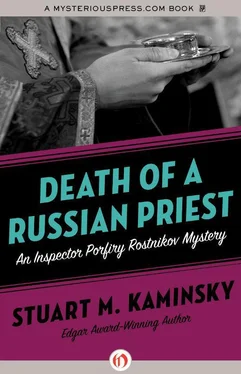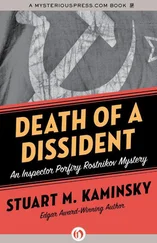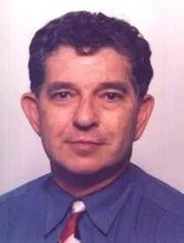Stuart Kaminsky - Death Of A Russian Priest
Здесь есть возможность читать онлайн «Stuart Kaminsky - Death Of A Russian Priest» весь текст электронной книги совершенно бесплатно (целиком полную версию без сокращений). В некоторых случаях можно слушать аудио, скачать через торрент в формате fb2 и присутствует краткое содержание. Год выпуска: 2012, Жанр: Полицейский детектив, на английском языке. Описание произведения, (предисловие) а так же отзывы посетителей доступны на портале библиотеки ЛибКат.
- Название:Death Of A Russian Priest
- Автор:
- Жанр:
- Год:2012
- ISBN:нет данных
- Рейтинг книги:3 / 5. Голосов: 1
-
Избранное:Добавить в избранное
- Отзывы:
-
Ваша оценка:
- 60
- 1
- 2
- 3
- 4
- 5
Death Of A Russian Priest: краткое содержание, описание и аннотация
Предлагаем к чтению аннотацию, описание, краткое содержание или предисловие (зависит от того, что написал сам автор книги «Death Of A Russian Priest»). Если вы не нашли необходимую информацию о книге — напишите в комментариях, мы постараемся отыскать её.
Death Of A Russian Priest — читать онлайн бесплатно полную книгу (весь текст) целиком
Ниже представлен текст книги, разбитый по страницам. Система сохранения места последней прочитанной страницы, позволяет с удобством читать онлайн бесплатно книгу «Death Of A Russian Priest», без необходимости каждый раз заново искать на чём Вы остановились. Поставьте закладку, и сможете в любой момент перейти на страницу, на которой закончили чтение.
Интервал:
Закладка:
“You are looking at the icon of Saint Maximilian Kolbe,” the nun called from the other room. “Everyone who comes here is drawn to it. The Catholic pope canonized him four years ago.”
Her voice was closer. Karpo turned to watch her enter the room and gesture at one of the five chairs that circled the room. The chairs, all wooden, straight-backed, and armless, faced a plain wooden table in the center of the room. On it stood a brass candle holder.
The austerity of the room suited Karpo and he felt comfortable as he sat facing the nun.
“The tea will be ready soon,” she said.
“Maximilian Kolbe,” Karpo said.
“Ah,” said the nun with a smile. “One of Father Merhum’s favorites. He was a Polish Catholic priest who exchanged places with a Jewish prisoner at Auschwitz during the war. The prisoner escaped, dressed as a priest, and Father Kolbe perished.”
Sister Nina smiled, and Karpo suddenly remembered when he had felt the way he did in the church. When he was a boy of ten, he had gone to his first party meeting in the gymnasium near his house. The massive banners with the red star and hammer and sickle had draped the wall behind the makeshift stage flanked by massive paintings, Lenin on the right and Stalin on the left. The room had been crowded and his father had been excited and had looked down at him with pride. People had smoked and talked until a trio of speakers had stepped forward. There was wild applause.
Then the three had spoken. With conviction and power they had spoken of the revolution, of the new world to come, of sacrifices and discipline. Emil Karpo had not understood it all, but he had been seized by it, by the cheers, the deep voices, the paintings, the banners. It had given his life meaning, a dedication to the party that had been torn from him in the past months.
“You remembered,” she said.
“I remembered,” he admitted.
A hissing came from the kitchen and the nun rose. “A moment,” she said.
Karpo willed the memory to go away, but it would not obey. He remembered vividly the worn pants of his father, and the man who stood to their right at that meeting, a cigarette dangling from his lips, his few teeth showing. The cap upon his head. He even remembered that his own palms had grown moist and that he had known that everyone in the hall felt as he did. He had been certain they were all of a single mind, a family united by communism.
The old nun returned with two cups and handed one to Karpo. The cups were brown, simple and large. The nun settled back in her chair across from the policeman.
“I wish to ask you some questions,” he said.
“What would you like to know?”
“Father Merhum, who might want to kill him? Who is Oleg?”
“Yes,” she said. “His last words to me. It was none of the Olegs who live in Arkush.”
“You are sure?”
“Yes,” she said.
“How can you be sure?”
“The Oleg from whom Father Merhum sought forgiveness is with our Lord. I can say no more.”
Karpo took one sip of the strong, hot tea and put the saucer and cup on the floor. “How long did you work with Father Merhum?”
“I have served him and our Lord for the past fifteen years,” she said. She had not drunk her tea, though she continued to look into it from time to time and to touch the rim of the cup with a tentative fingertip.
“And before you came?”
“Father Merhum’s life was inseparable from the history of our church. Have you time?”
“I have time,” he said.
“In 1917, when I was two years old,” she began as if she were a Gypsy reading the images that appeared in the steaming cup she cradled in her hands, “before your revolution, there were over a thousand monasteries and nunneries in Russia. There were also more than eighty thousand Orthodox churches. Today there are seventy-five hundred.
“By the fall of the following year special commissions began to eliminate the churches. The procedure was simple. The GPU, which was soon replaced by the NVD and later by the KGB, would arrest a priest for being a ‘counterrevolutionary,’ shoot him, or send him to Siberia. His church would be torn down or turned into government offices. Before your revolution half a million people worked in churches the same number of people who were in your Bolshevik party.
“Through the next years nuns smuggled the Eucharist to arrested priests in loaves of bread and apples. When they were caught, they, too, were imprisoned or executed.
“And the people, so many of them believed that the Church was in league with the fascists. Before the end of the war with the Germans the Church was in ruins. There were less than one hundred active churches. The few surviving priests were broken, frightened, hiding. Thousands, thousands of priests were murdered. The truth lies hidden behind the doors of Lubyanka in Moscow. It was just before the war that Father Merhum, the older Father Merhum, came to Arkush from the west with his wife and his son. They came on foot. During the war, in spite of the horrors the government had visited on our holy church, Metropolitan Sergei and the Orthodox Church rallied believers to battle the invading Nazis. And the Church donated millions of rubles to the struggle.”
Sister Nina looked up from her tea as if a trance had been broken. “There is more, much more,” she said, “but all you need to know is that there were those who never lost their faith. They never stopped giving their love to priests like Father Merhum. There are tens of millions of us. Our faith in our priests cannot be shaken. Your tea will get cold.”
Karpo reached down and picked up the cup and saucer. As he drank he watched the old woman over the rim of his cup. She smiled at him warmly. He was not accustomed to people smiling at him.
“Something amuses you?” he asked.
“Something pleases me,” she said. “A priest dies and a convert comes. A death is followed by a birth. It is God’s grace.”
Karpo stood and placed his cup and saucer on the table next to the candlestick. “You have misread me,” he said, looking down at her.
“You are a true believer,” she answered. “A true believer needs a cause or he will wither. It is known in the lives of the saints that a man is twice blessed who embraced the devil before he embraces God. I see it in your eyes. During the service for Father Merhum the Holy Mother found you.”
“Do you have any idea who killed Father Merhum?” Karpo asked evenly.
“You change the subject,” she said.
“I cannot believe in your religion simply because the revolution has failed.”
“I do not expect you to,” she said. “But it will come. It has already begun.”
“Do you have any idea who murdered Father Merhum?” he repeated.
“He was killed on the morning of the day he was to denounce those for whom the day of retribution had come,” she said.
“Party members,” said Karpo.
“Father Merhum’s list was not limited to the secular. He was not beloved by the hierarchy of the Church.” She stood and placed her cup next to Karpo’s on the table. “There are Orthodox leaders who spoke for the government, supported government claims that freedom of worship was welcome. The Church donated millions of rubles to the Soviet Peace Committee. All religious activity was regulated through the Council for Religious Affairs.”
“You believe that the Church ordered Father Merhum murdered because-”
“-he was about to denounce the Church,” she finished. “There are those who believe this. There are a few in the Church who are not true Christians, and it is they who have risen as tyrants rose.”
“You are a revolutionary,” Karpo said.
“And you are in need of a new revolution.”
“I must go,” he said.
Читать дальшеИнтервал:
Закладка:
Похожие книги на «Death Of A Russian Priest»
Представляем Вашему вниманию похожие книги на «Death Of A Russian Priest» списком для выбора. Мы отобрали схожую по названию и смыслу литературу в надежде предоставить читателям больше вариантов отыскать новые, интересные, ещё непрочитанные произведения.
Обсуждение, отзывы о книге «Death Of A Russian Priest» и просто собственные мнения читателей. Оставьте ваши комментарии, напишите, что Вы думаете о произведении, его смысле или главных героях. Укажите что конкретно понравилось, а что нет, и почему Вы так считаете.












